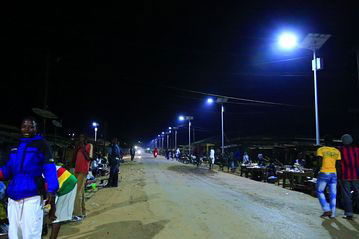For many years, small solar companies have been bringing light to off-grid communities in Africa, and now the effort is taking leap forward.
14 African countries announced they are joining Energy Africa to bring solar to the 620 million people who still lack access to electricity.
Until now, progress has been too slow – at the current rate, 300 million people will still be without light by 2040, former UN Chief Kofi Annan, told The Guardian.
"We must now come together to break the deadly interaction between poverty and unsustainable energy systems," he says, noting that Africa doesn’t have to follow the carbon-intensive pathway.
Last year, around 7.5 million tiny solar systems were sold in Africa, an incredible increase from the 40,000 sold in 2009, according to the White House.
A combination of low-cost solar and LED lights, and increasing access to mobile phones makes this possible. Now, even in remote areas, people can pay for solar electricity via cell phone.
"As a businessman, I view this transition not as a burden but as a historic opportunity, and I feel strongly that universal access to clean, renewable sources of energy can be achieved in our lifetime – even in this generation," says Sir Richard Branson, who plans to invest.
The UK and US made fresh commitments to help through financing. The US announced commitments that will provide solar to 500 million people by 2020, through $125 million in funding.

African Development Bank (AFD) has much bigger plans, aiming to mobilize $55 billion to eliminate Africa’s energy deficit by 2025. Under the "New Deal for Energy in Africa" AFD will prioritize energy finance as is calling on countries to do the same. "We are working with governments to create frameworks to encourage private investment in clean energy," Alex Rugamba of AFD told Bloomberg.
In South Africa alone, 4.3 gigawatts of renewable energy projects have come online in just the past four years, providing about 10% of the country’s electricity. Large solar and wind projects are also in the pipeline across the continent.
This year, Environment Ministers across Africa released the Cairo Declaration, with all 54 countries demanding that global warming be limited to 1.5C by 2100. In it, they also pledge to an "inclusive green economy" and to improve protection of the continent’s abundant natural resources and wildlife.
On that front, Kenya, Tanzania, Uganda, Madagascar and Mozambique signed the Zanzibar Declaration, agreeing to work together to stop trade in illegal timber. National forest agencies will share intelligence, implement log export bans and develop monitoring and reporting systems. It also urges countries that receive illegal lumber to prioritize the issue.
Over the past 10 years, primary forest cover is down by 6.3 million hectares, according to the UN Food and Agriculture Organization (FAO). This is an alarming rate, says World Wildlife Fund.
Read our article, Africa Gets Its First Solar Academy.

